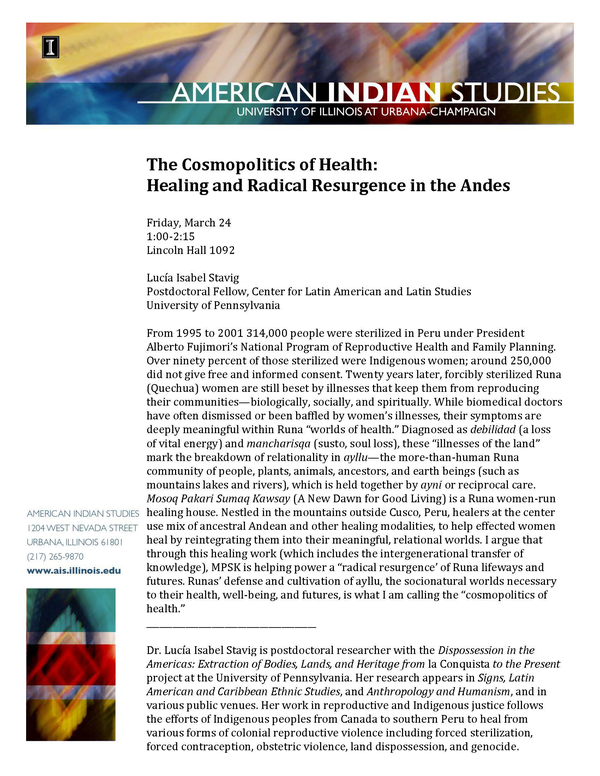
The Cosmopolitics of Health: Healing and Radical Resurgence in the Andes
- Event Type
- Lecture
- Sponsor
- American Indian Studies
- Location
- Lincoln Hall 1092
- Date
- Mar 24, 2023 1:00 - 2:15 pm
- Views
- 42
Lucía Isabel Stavig Postdoctoral Fellow, Center for Latin American and Latin Studies University of Pennsylvania
From 1995 to 2001 314,000 people were sterilized in Peru under President Alberto Fujimori’s National Program of Reproductive Health and Family Planning. Over ninety percent of those sterilized were Indigenous women; around 250,000 did not give free and informed consent. Twenty years later, forcibly sterilized Runa (Quechua) women are still beset by illnesses that keep them from reproducing their communities—biologically, socially, and spiritually. While biomedical doctors have often dismissed or been baffled by women’s illnesses, their symptoms are deeply meaningful within Runa “worlds of health.” Diagnosed as debilidad (a loss of vital energy) and mancharisqa (susto, soul loss), these “illnesses of the land” mark the breakdown of relationality in ayllu—the more-than-human Runa community of people, plants, animals, ancestors, and earth beings (such as mountains lakes and rivers), which is held together by ayni or reciprocal care. Mosoq Pakari Sumaq Kawsay (A New Dawn for Good Living) is a Runa women-run healing house. Nestled in the mountains outside Cusco, Peru, healers at the center use mix of ancestral Andean and other healing modalities, to help effected women heal by reintegrating them into their meaningful, relational worlds. I argue that through this healing work (which includes the intergenerational transfer of knowledge), MPSK is helping power a “radical resurgence’ of Runa lifeways and futures. Runas’ defense and cultivation of ayllu, the socionatural worlds necessary to their health, well-being, and futures, is what I am calling the “cosmopolitics of health.”
---------------------------------------------------------------------------------------------
Dr. Lucía Isabel Stavig is postdoctoral researcher with the Dispossession in the Americas: Extraction of Bodies, Lands, and Heritage from la Conquista to the Present project at the University of Pennsylvania. Her research appears in Signs, Latin American and Caribbean Ethnic Studies, and Anthropology and Humanism, and in various public venues. Her work in reproductive and Indigenous justice follows the efforts of Indigenous peoples from Canada to southern Peru to heal from various forms of colonial reproductive violence including forced sterilization, forced contraception, obstetric violence, land dispossession, and genocide.